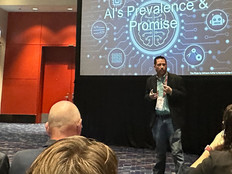Business Partnerships Pay Off in a Changing Job Market
With higher education costs reaching the budgetary limits of many American families, students and parents are demanding that institutions equip graduates with the technical and business skills they will need to launch their careers. It’s a tall order in an economy and a technology environment that are constantly evolving.
To take one example, many of today’s most in-demand professions — such as data analysts and social media managers — didn’t even exist 10 years ago. In fact, career paths, technology solutions and the skill sets required for success can shift dramatically between the time students start college as freshmen and the time they graduate. That’s why the results of an IBM Institute for Business Value Study, “Pursuit of relevance: How higher education remains viable in today’s dynamic world,” while disturbing, are not terribly surprising.
Creating New Measures of Success
According to the IBM study, industry and academic leaders alike identify job placement as the surest measure of educational worth. However, fewer than half of the survey respondents (49 percent) believe that higher education institutions are meeting students’ needs, and only 43 percent say that institutions equip students with the skills they’ll need in the workforce.
Respondents also gave mixed reviews on two other measures of higher education: Forty-seven percent believe that a college education meets the needs of society, and 41 percent believe that it meets the needs of industry.
The study suggests ways for higher education institutions to align more closely with the market that students will encounter post-graduation:
- Assess curricula to identify opportunities for experience-based learning techniques, new technologies and real-world learning experiences such as internships and apprenticeships.
- Apply hard metrics to monitor and evaluate the impact of real-world learning programs on student skills and capabilities.
- Build alliances with industry partners to identify opportunities for programs around real-world learning experiences.
Gaining Hands-On Tech Experience
Many higher education institutions already recognize the importance of industry partnerships and are working toward them. For example, IBM has set up an Educational Collaboration Center in North Carolina State University’s Centennial Campus for joint projects between company employees and the university’s students and faculty. So far, they have tackled projects and research related to Watson (IBM’s technology platform that uses natural language and machine learning) and the Internet of Things. IBM also encourages students to propose their own projects, including startup ideas, around IBM technologies such as Bluemix (next-gen cloud), Blockchain (business process re-engineering) and Power Systems (open server architecture).
Phoenix-based Avnet reached out to Arizona State University in an effort to help students cultivate the business and technical skills that Avnet and similar companies require. In addition to offering extensive student internships, Avnet announced in May a new partnership with ASU: It will help fund and develop an innovation lab where aspiring entrepreneurs can receive business consultation and venture capital support to develop “new technology, especially inventions that make the world a better place.”
Increasingly, higher education institutions, particularly engineering schools, are encouraging or even requiring students to take advantage of co-ops. These differ from internships in that they are paid, temporary, full-time jobs with companies in tech and other industries, during which the student takes a complete break from college classes. Rochester Institute of Technology (RIT) is known for requiring such co-ops for just about every student, at both local businesses and major corporations such as Canon USA, IBM and Hitachi Data Systems.
Most RIT students take at least two co-ops. The institution sees them as a great way to not only give students real-world career skills and experience, but also to help them define career paths more realistically. Boston-based Northeastern University is another institution that emphasizes co-ops for all of its students, and others are jumping on the co-op bandwagon.
The skills and insights that students gain from such experiences go well beyond the technical, as they should. Says one RIT co-op student, “One of my biggest takeaways from my co-op is understanding how to communicate in a corporate setting and work with multifunctional teams, both within and outside of the corporation.”
This article is part of EdTech: Focus on Higher Education’s UniversITy blog series.









